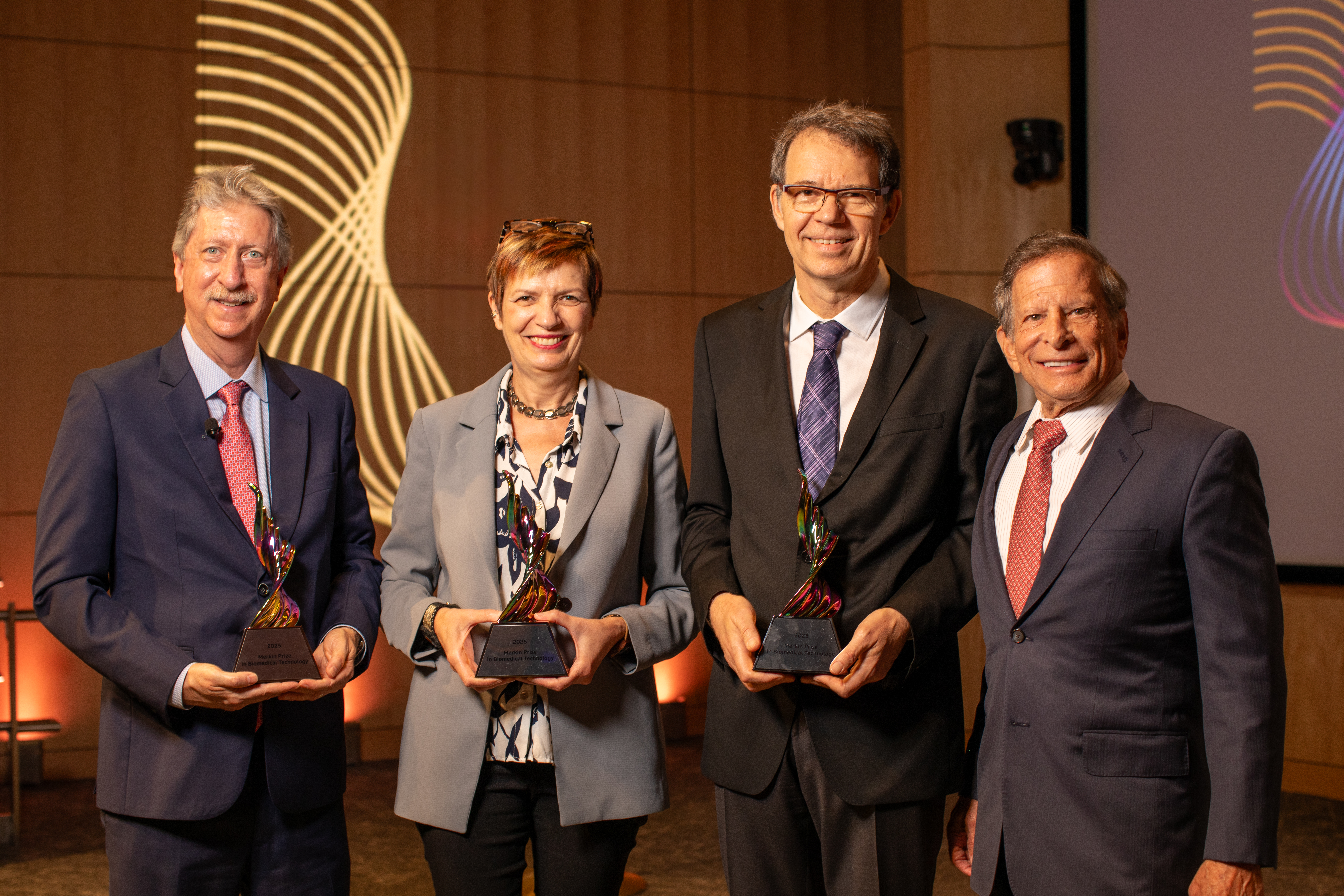This groundbreaking form of personalized cancer immunotherapy has had remarkable success — more than 45,000 cancer patients worldwide have been treated with CAR T-cell therapy, extending their lives and, in many cases, delivering complete and sustained remissions.

This groundbreaking form of personalized cancer immunotherapy has had remarkable success — more than 45,000 cancer patients worldwide have been treated with CAR T-cell therapy, extending their lives and, in many cases, delivering complete and sustained remissions. Credit: Erik Jacobs, Anthem Multimedia
The 2025 Richard N. Merkin Prize in Biomedical Technology was jointly awarded to Carl June, Bruce Levine, Isabelle Rivière, and Michel Sadelain in a ceremony and symposium at the Broad Institute on September 30, 2025. The prize, created by the Merkin Family Foundation and administered by the Broad, recognizes novel biomedical technologies that have significantly improved human health and carries a $400,000 award. [Event Video]
June, Levine, Rivière, and Sadelain were announced as winners in May for pioneering CAR T-cell therapy, a technology that has reshaped how physicians treat leukemia, lymphoma, and multiple myeloma — and is now showing promise in treating autoimmune and infectious diseases [Bios of June, Levine, Rivière, and Sadelain]. Early stage clinical trials for CAR T cell therapy are also underway for breast, pancreatic, prostate and other cancers that claim millions of lives every year.
In CAR T-cell therapy for cancer, a patient’s own immune cells are engineered into precise tumor killers, becoming what has been called “the first living drug.” They are removed from the patient’s body, reprogrammed to attack tumor cells, and infused back in. They then can turn into an army of hundreds of millions of cells in the patient that continue to multiply and guard against cancer after eliminating the last tumor cell. More than 45,000 cancer patients worldwide have been treated with CAR T-cell therapy, extending their lives and, in many cases, delivering complete and sustained remissions.
In remarks at the symposium, Richard N. Merkin praised the prizewinners for their persistence and tenacity: “They looked for the possible in the impossible. They pushed through their comfort zones, they made things happen. They challenged themselves, sometimes boldly, to depart from current processes. They challenged conventional wisdom; daring the world to abandon the known for an uncertain tomorrow is a bold and provocative act. Breakthroughs require pattern breaking, but being extraordinarily different is the key to any breakthrough.”
Nobel laureate Harold Varmus, the Lewis Thomas University Professor at Weill Cornell Medicine and chair of the Merkin Prize selection committee, noted that the Merkin Prize’s emphasis on impactful technologies is “not characteristic of prizes in general. Most prizes are given for discoveries — finding something new — as opposed to inventing a process that becomes useful. Our charge has been to identify someone or some group of people who have put together a technological triumph that has had beneficial effects on large numbers of people.”
Todd Golub, director and founding core institute member of the Broad Institute and a physician-scientist who pioneered the application of genomics to cancer biology, offered his perspective on CAR T-cell therapy: “You have to understand how contrarian this idea was. It was not at all obvious that you could tweak the immune system to do anything useful against cancer. When I did my clinical training, the conventional wisdom was that there was no role of the immune system in combating cancers.”
Tom Furdon, diagnosed with acute lymphoblastic leukemia in July 2019 but now fully recovered, shared his journey as one of the first patients to receive CAR T-cell therapy. “In no time, I was feeling much better and on my way to recovery,” he said. “The speed of these [CAR T-] cells is amazing. Within a week, I was finally on my way home after almost two months in the hospital.”
Both Furdon and his wife, Cheryl, thanked the awardees and the doctors at Massachusetts General Hospital — including Matthew Frigault, who oversaw Furdon’s CAR T-cell therapy, and was in attendance. “I wouldn’t have a husband if it wasn’t for all of you,” Cheryl Furdon said. “Six years ago, that would’ve meant me coming home and telling my eleven-year-old and my nine-year-old that their father would not be home. That’s torturous. And it’s a lot to have to live with. Six years later, here we are.”
Marcela Maus, professor at Harvard Medical School and director of cellular immunotherapy at Mass General Brigham, explained how CAR T-cell therapy works, and expressed her appreciation for the many years of collaborative research that brought CAR T-cell therapy from labs to the clinic.
The four prizewinners each gave short presentations outlining their roles in pioneering CAR T-cell therapy. Sadelain talked about the early stages of the development of CAR molecules and the selection of the protein CD19 as a therapeutic target in CAR T-cell therapy. Levine detailed the process of turning CAR T-cell therapy from a technology developed in academic labs into a therapy suitable for clinical trials. Rivière described the manufacturing process of CAR T-cells, including steps for quality assurance and regulatory compliance. June added his remarks via a recorded video message: “The prize isn’t just for us four individuals. It’s a testament to the collective and often arduous scientific journey and the power of our long-term collaboration.”
Following the prizewinner presentations, Varmus moderated a panel discussion with Levine, Maus, Rivière, and Sadelain on the present and future of CAR T-cell therapy.
Merkin’s partnership with the Broad includes the Merkin Institute Fellows, established in 2012 as the Broad’s first endowed fellowship; the Merkin Institute for Transformative Technologies in Healthcare, launched in 2017 to support paradigm-shifting projects from researchers at the Broad, Harvard, MIT, and the Harvard-affiliated hospitals; the Richard Merkin Professorship (also established in 2017), an endowed professorship held by David Liu, who leads the Merkin Institute for Transformative Technologies in Healthcare; and a generous new commitment in 2021 that advanced the aforementioned programs and launched the Merkin Prize. It was also in 2021 that, in recognition of Merkin’s partnership, the Broad named its building at 415 Main Street the Richard N. Merkin Building.
Nominations for the 2026 Merkin Prize are now open and will close on December 5, 2025, at 11:59 p.m. ET. For further information on how to nominate for the 2026 Merkin Prize, please visit the prize website. Eligibility extends to all investigators who have developed relevant health innovations, regardless of their place of employment, including academia, the commercial sector, or government. Both teams and individuals who have made a profound impact on medicine by pioneering a transformative technology are eligible.
About the Merkin Family Foundation
The Merkin Family Foundation was founded by visionary health care executive Richard Merkin, M.D., who is the founder and CEO of Heritage Provider Network, Inc. (HPN). HPN is one of the largest physician-founded and physician-owned managed care organizations in the country dedicated to value-based healthcare delivery improvements. HPN develops and manages coordinated, patient-doctor centric, integrated health care systems that offer some of the strongest solutions for the future of health, care, and cost in the U.S. HPN and its affiliates operate in New York, California, and Arizona, providing high-quality, cost-effective healthcare with over one million patient members. HPN is dedicated to quality, affordable health care, and putting patients’ wellness first.
About the Broad Institute
Broad Institute is an independent, non-profit research organization whose mission is to understand the roots of disease and close the gap between new biological insights and impact for patients.
Founded in 2004 by the visionary Los Angeles philanthropists Eli and Edythe Broad, the Broad Institute exists at the intersection of scientific disciplines, convening scientists and other experts from genomics, cell biology, chemistry, engineering, neuroscience, therapeutics, artificial intelligence/machine learning, computational biology, and public health. The Broad Institute engages thousands of scientists from MIT, Harvard, Harvard’s primary teaching hospitals, other academic institutions, and leading corporate partners in the pharmaceutical and biotechnology industries, all of whom share the goal of translating research findings into safe and effective therapeutic interventions for all common and rare diseases.
